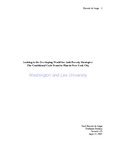Looking to the Developing World for Anti-Poverty Strategies: The Conditional Cash Transfer Plan in New York City

View/
Author
Kiewiet de Jonge, Chad P.
Subject
Washington and Lee University, Shepherd Poverty Program
New York (State) -- New York
Poverty -- Government policy -- Evaluation
Human capital
Rewards and punishments in education
Metadata
Show full item recordDescription
Chad P. Kiewiet de Jonge is a member of the Class of 2007 of Washington and Lee University. Capstone; [FULL-TEXT FREELY AVAILABLE ONLINE] Mayor Bloomberg's decision to appropriate an anti-poverty strategy from the developing world demonstrates his administration's clear determination to attack the dual problems of youth disconnection and poverty in an innovative fashion. Indeed, looking toward "dramatic interventions" for young adults seems increasingly attractive for public policy experts, who have struggled to identify successful ways to address poor education and job preparedness (Rankin, 2003, p. 4). Although CCT programs have demonstrated remarkable success in the developing world, it does not necessarily follow that a CCT program in New York City would have similar positive results. Indeed, as critics of the proposal point out, there are significant differences between the situation of the poor in New York City and in Mexico City. Nonetheless, if city officials design the CCT program with special attention to the realities of disconnection and poverty for New York City's young adults, the likelihood of success in the developed world setting will increase. Based on the recently announced details of the Opportunity NYC program (see footnote 2), it appears that the mayor's office has been careful to design the plan with this in mind. Indeed, the pilot plan in many ways mirrors the recommendations forwarded in this paper; it also goes beyond these recommendations by including a healthcare component. Finally, given that the pilot program will be financed entirely by private funding, the argument for not experimenting with the CCT program in New York City becomes even weaker. With the promise of thorough impact assessments of the program, the city can determine if the developed world can really look toward poor countries to learn how to combat persistent poverty. [From Concluding Remarks/Implications] Chad Kiewiet de Jonge